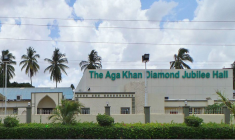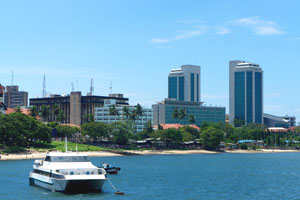








|
Tanzania , officially the United Republic of Tanzania (Swahili: Jamhuri ya Muungano wa Tanzania), is a country in East Africa in the African Great Lakes region. It is bordered by Kenya and Uganda to the north; Rwanda, Burundi and the Democratic Republic of the Congo to the west; and Zambia, Malawi and Mozambique to the south. The country's eastern borderis formed by the Indian Ocean. Kilimanjaro, Africa's highest mountain, is in northeastern Tanzania.
The country is divided into 30 administrative regions: five on the semi-autonomous islands of Zanzibar and 25 on themainland in the former Tanganyika.The head of state is President Jakaya Mrisho Kikwete, elected in 2005. Since 1996, the official capital of Tanzania has been Dodoma, where the National Assembly and some government offices are located. |
 |
| Foreign Relations | |
Tanzania has good relations with its neighbours. It is a member of the East African Community (EAC), along with Uganda, Kenya, Rwanda, and Burundi. Within the EAC, there is free trade and free movement of people, including theright to reside in another member country for the purpose of employment.Tanzania is also a member of the Southern AfricanDevelopment Community (SADC).The EAC, the SADC, and the Common Market for Eastern and Southern Africa are currently negotiating an agreement to create a Tripartite Free Trade Area spanning 26 African countries. |
|
| Economy and Infrastructure | |
Tanzania's economy is largely dependent on agriculture, which employs about 75% of its population. An estimated 34% of Tanzanians currently live in poverty.[5] The economy has been transitioning from a command economy to a market economy since 1985. Although total GDP has increased since these reforms began, GDP per capita dropped sharply at first, and only exceeded the pre-transition figure in around 2007. |
|
| External Trade and Investment | |
Tanzania's history of political stability has encouraged foreign direct investment. The government has committed itself to improve the investment climate including redrawing tax codes, floating the exchange rate, licensing foreign banks, and creating an investment promotion center to cut red tape. Tanzania has mineral resources and a largely untapped tourism sector, which might make it a viable market for foreign investment. The stock market capitalisation of listed companies in Tanzania was valued at $588 million in 2005 by the World Bank. |
|
| Industry | |
Accounting for 22.6% of GDP, Tanzania's industrial sector is one of the fastest growing in Africa (2010 rankings). Though it has been hit hard recently by persistent power shortages caused by low rainfall in the hydroelectric dams catchment areas, a condition compounded by years of neglect and bad management at the state-controlled electric company. Management of the electric company was contracted to the private sector in 2003. And power production countrywide is currently undergoing various diversification projects. The main industrial activities include agricultural processing (sugar, cigarettes, sisal twine), diamond-, gold-, and iron mining, oil refining, wood products, salt, soda ash, cement, shoes, apparel and fertilizer productions.
|
|